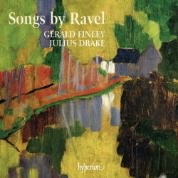Baritone recordings of Ravel songs are very rare (Souzay and Fischer-Dieskau being the best-known) and until this release, modern ones were virtually non-existent. But Canadian Gerald Finley and his superb piano partner Julius Drake have not only satisfied a catalog deficiency, but they also have created an essential entry into the Ravel discography.
Finley’s warmly resonant and extraordinarily expressive voice proves an ideal vehicle for this wide array of songs (just as it did for his inimitable exploration of Ives and Barber for this same label), surprisingly one of a very few recordings dedicated to Ravel’s solo-voice repertoire. One of the things you notice is that Finley’s French is so clear and articulate and near-perfect it’s almost a distraction(!), yet his inflection and phrasing are so artfully, musically modulated and sensitive to the text that we can’t help but appreciate the clarity for the way it illuminates the poetic aspects of each song.
Finley virtually commands our attention in the five songs of Histoires naturelles, showing his impressive range of mood-and-scene-painting technique (and highlighting Ravel’s songwriting genius!), especially in “Le grillon” (the cricket) and “La pintade” (The guinea-fowl, with its frighteningly wild piano accompaniment). Other notable moments are in the variously expressed emotions of “D’Anne qui me jecta de la neige”, “Ronsard à son âme”, “Chanson épique”, and “Un grand sommeil noir”. Finley also proves his dramatic credentials with his compelling renditions of the three Don Quichotte à Dulcinée songs (including the suitably clever and raucous “Drinking song”) and “Sur l’herbe”, a conversational poem by Paul Verlaine involving a lustful abbot and lines such as “May I die, ladies, if I don’t detach a spangle from your hair!”
Finley–and Ravel–and pianist Drake–are at their very best in the lovely “Five Greek Folksongs”, in the Deux épigrammes de Clément Marot, and in the strange and wonderful “Noël des jouets”, about Christmas toys coming to life and “the sinister dog” Beelzebub, waiting to devour the colored-sugar Jesus.
As we have heard in previous recordings, Finley’s voice is pure pleasure–73 minutes goes by easily and effortlessly, and whether it’s French or German or English, it doesn’t matter because whatever the language or repertoire he unfailingly communicates the essence of the music and poetry. Top-notch sound and informed, easily readable liner notes complete an irresistible, essential package for all vocal music fans. Bravo! [6/12/2009]
































